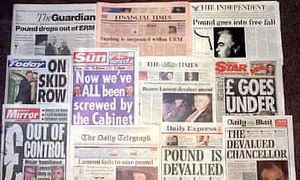Black Wednesday
 Reporting in the UK commercially-controlled media | |
| Date | 16 September 1992 |
|---|---|
| Description | The swift transfer of over 3 billion pounds to financial speculators from UK taxpayers. |
| Participants | Norman Lamont, George Soros, currency speculators |
Black Wednesday saw currency speculation against the UK pound which saw over 3 billion pounds transferred from UK taxpayers to currency speculators.
Contents
Official narrative
On 16 September 1992, a.k.a. 'Black Wednesday', the UK Chancellor of the Exchequer, Norman Lamont sold around £27 billion of sterling reserves in a bid to prevent leaving the Exchange Rate Mechanism. However, he eventually succumbed to the "free market" and did so, entailing a loss of around £3.3 billion to the UK treasury.[1]
Fortunate accident?
This is generally understood as an accidental loss, one in which politicians learned humility in the face of the they had regulated into existence. The fact remains however, that Lamont's decisions caused people he knew personally to make immense profits at the UK tax payers' expense, opening up the possibility that it was no mere fluke.
Cui bono?
George Soros in particular, lead the short selling of sterling for some days before, and pocketed over £1 billion profit from the episode. Interestingly, Soros is strongly suspected to be a member of Le Cercle, a highly secretive deep state milieu of which Lamont was a member and which he later chaired.[2]
Lamont's cheerfulness
At a press conference two weeks later, Lamont when asked why he was so cheerful, replied "Well, it is a very beautiful morning, but it is funny you should say that. My wife said she heard me singing in the bath this morning."[3]
Known Participants
2 of the 3 of the participants already have pages here:
| Participant | Description |
|---|---|
| Norman Lamont | Long time Chairman of Le Cercle, financier, politician and deep politician, involved in arms and financial deals. |
| George Soros | Financial speculator, Beneficiary of Black Wednesday |